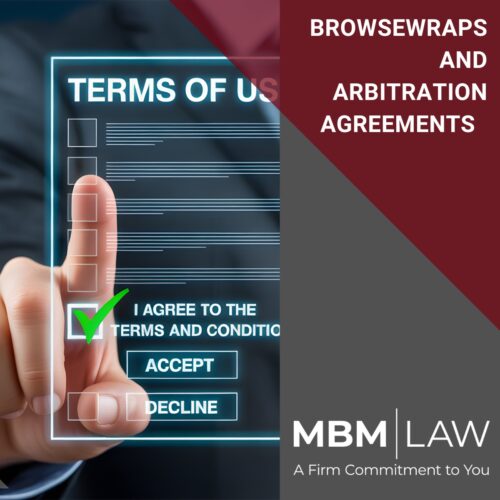Essential Steps and Legal Standards Every App and Website Developer Should Know to Make Arbitration Clauses Stick
Business owners developing apps or websites should understand how to lawfully enforce arbitration agreements in Pennsylvania. Simply linking your terms and conditions and asking users to click “Agree” is no longer enough to ensure your arbitration agreements will hold up in court. Certain necessary standards exist for business owners looking to include arbitration agreements within the terms and conditions of their app or website. These arbitration agreements are contained within the browsewraps which cover access to or use of materials on a website or downloadable product.
Making Arbitration Clauses Enforceable in PA
Within their terms and conditions, app or website developers may be interested in including an arbitration clause. These clauses ask users to waive their right to a jury trial, allowing potential disputes with the company to be settled in arbitration meetings, as opposed to in trial, saving the company time and potential costs. But as seen in recent challenges like Natalie Pierce v. Empower Finance Inc., when these agreements are not correctly established, requests to compel arbitration may be denied, and the option of staying litigation may be unachievable.
Ensure your arbitration agreements are legally sound and enforceable by choosing the experienced business lawyers at MBM Law to guide you through Pennsylvania’s legal requirements.
Key Legal Standards for Online Agreements in PA
Pennsylvania law sets a clear minimum requirement for web designers creating enforceable online agreements, as seen in cases like Berman v. Freedom Financial Network. Simply including a hyperlink to terms and conditions followed by a button click is not enough. The hyperlinked text must be visually “set apart” from surrounding content, and the button’s function must explicitly inform the user that clicking it constitutes an unambiguous agreement to the terms. For instance, designers should use language such as, “By clicking ‘Agree,’ you agree to the terms and conditions.” In Pierce v. Empower, a confirmation code was deemed insufficient for unambiguous agreement, reinforcing the need for clear, explicit language and bold formatting to define what user action signifies consent.
Building on these standards, another case, Chilutti v. Uber Technologies, remains the controlling precedent for “browsewrap” agreements in Pennsylvania. This case introduces a stricter, two-part test for agreements where users don’t explicitly sign. First, an explicit waiver notification must be prominently displayed on the registration screen, informing consumers that they are waiving their right to a jury trial. This notification must be presented before the registration process can be completed. Second, for agreements accessed via a link, the visible waiver link must not be buried within the terms. Instead, the waiver information must appear at the top of the first page in bold, capitalized text to ensure it is clearly visible to the user.
Checklist for Enforceable Arbitration Agreements in PA
To make sure that agreement to an arbitration clause is binding and enforceable according to Pennsylvania law, regardless of upcoming decisions, website or app developers should implement the following practices:
Use Explicit and Visible Language
Use explicit and easily visible language to inform the consumer when they are binding themselves to an agreement. Include a bold, clearly worded statement above an “Accept” or “Agree” button that states that pressing of the button indicates agreement to terms and conditions.
Prioritize Arbitration Agreements
- Make arbitration agreements the primary focus of conditions agreements, not something simply listed among other terms of use. Ensure that:
-
Inform the Consumer Before Registration
- The consumer is informed of what the arbitration agreement entails before registration can be completed. Explicitly state on the application screen that registration involves waiving the right to a jury trial.
-
Make the Waiver Link Visible
- If terms and conditions are accessed through a link, as opposed to being printed in full on the registration screen, ensure that the arbitration agreement and the waiver it entails is at the TOP OF THE FIRST PAGE in BOLD, CAPITALIZED TEXT.
-
Example Language for Terms Screens: BY CLICKING “AGREE”, YOU ARE BINDING YOURSELF TO OUR TERMS AND CONDITIONS, INCLUDING THE ARBITRATION AGREEMENT BELOW AND WAIVING YOUR RIGHT TO A JURY TRIAL.
Ensure Your Business is Aligned with PA Law
Given the evolving legal landscape, it’s crucial for app and website developers to stay ahead of the curve. Ensuring your user agreements are designed correctly is the best way to legally protect your business.
MBM Law’s business attorneys will work with you to ensure your dispute resolution strategy is aligned with Pennsylvania’s current precedent. Contact us today at 412.242.4400 to start updating your user acceptance policy.

John Prorok possesses an invaluable understanding of privately held business owners’ needs in business planning, corporate formation, and transactions. He frequently speaks and counsels emerging and start‐up enterprises, offering insightful legal strategies toward success. John is a highly regarded Human Resources lawyer offering clients tailored solutions. He regularly advises employers on compliance issues regarding employment laws and regulations.

